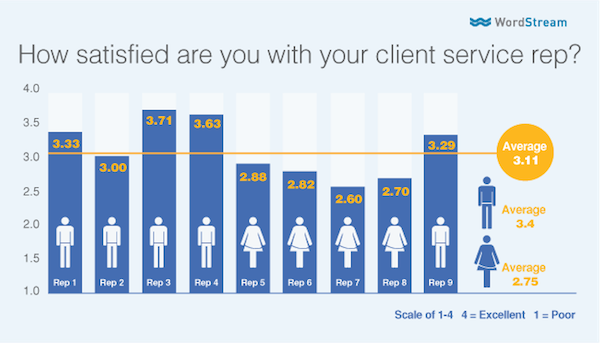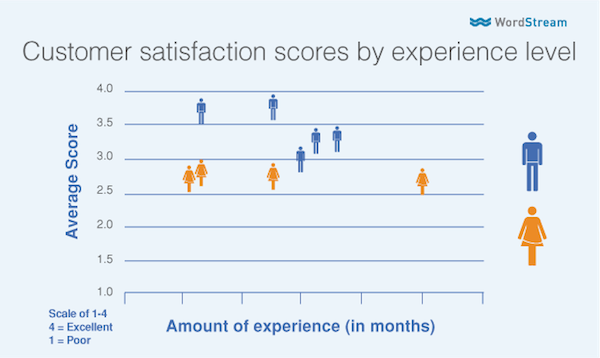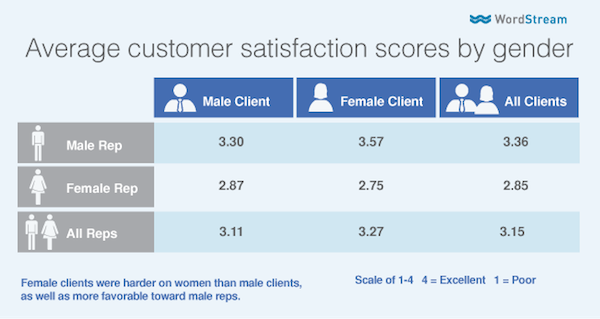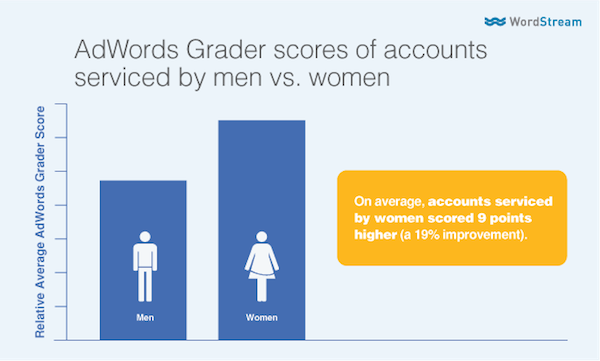The debate goes on about the gender gap – and that’s true no matter what the industry, and no matter how much some people may want it to go away. Both men and women have passionate views about the topic, and the subject is multifaceted and multilayered. To say an issue like this is complicated is an understatement.
The topic is once again front and center in the Web marketing industry with research coming from WordStream, which recently attempted to quantify gender bias in business. The research essentially looked at whether women’s expertise was valued less than men’s in a business environment where Web marketing clients worked with both men and women representatives.
The findings showed women in the environment studied experienced a 21 percent gender bias gap, according to WordStream, and that “women are, on average, viewed as 21 percent less valuable than their male peers, regardless of experience and other performance metrics,” Larry Kim, CEO of Wordstream, said in a blog post that discussed the findings.
The study derived data from 300 respondents of a survey that measured client satisfaction levels as it related to individual customer service reps at WordStream. When WordStream segmented the data to identify top customer service employees, it found almost all of the men had scores above the group average, and all of the women had scores below the group average.

“The male client service rep with the lowest score still did better on the survey than the female client service rep with the highest score,” Kim reported.
Did experience play a factor here? Did the men with the higher scores happen to have more time on the job than the women? According to the research, no. In fact, the woman with the most experience overall still had a lower score than the male service rep with the least amount of experience on the team.

Commentary from WordStream’s internal staff on the issue speculated that clients may take male representatives more seriously than females.
“I think this has a lot to do with the way that men carry themselves and a varying sense of confidence (or perceived confidence) between men and women,” an anonymous female WordStream staff member was reported as saying. “The perception is sometimes that men know more simply because they sound more confident … I think men in general are better at just telling people what they want to hear rather than working with them in a more sympathetic manner.”
The research then looked at the gender of the clients scoring their client service reps to see if perhaps the low scores for women correlated with male clients who were paired with female service reps.
“The gender bias was actually more dramatic among female clients, who scored female reps by an average of .82 points lower than they would male reps (compared to .43 lower score by male clients),” Kim said.

Another question the research attempted to answer was if there was a link between poor scores and poor performing PPC accounts. The findings showed that the accounts serviced by female representatives actually performed better.

Because the client service reps only act as advisors to the clients, and the clients must implement the recommendations coming from WordStream staff, could it be that the female reps had more proactive clients? And, even though the data suggests clients are less satisfied with the women representatives, are they still heeding their advice?
Kim said he suspect the clients are indeed heeding the advice of the female reps, as those clients had better-performing accounts.
“Because it’s a pretty random assignment of clients to reps, I certainly wouldn’t expect on average, for all the proactive clients to be assigned to women, and the less proactive clients to end up with men reps,” he said. “Rather, I think it would be more or less the same.”
As with any study, the sample and methodology are key to generalizing the results to the population. However, Kim said he had high confidence in the data and its analysis, because the numbers between men and women “weren’t even close. As an example, you can call an election outcome pretty quickly if the early returns aren’t even close,” he said.
What about interpersonal relationship factors that could be at play between the clients of WordStream and their individual reps? Kim cited a couple reasons why he believed this wasn’t a factor, saying the research identified cases where bias came before the clients had even met the reps.
“Furthermore, we segmented by level of experience and the bias held. Those two facts lead me to believe that it is not merely a matter of personality factors as they relate to interpersonal relationships as you suggest, but rather the result of a systematic, underlying gender bias.”
In response to the following question that WordStream asked its staff: “Have you ever felt that you were discriminated against because of your gender?” One anonymous woman had this to say:
“100 percent yes – by both female and male clients. I’ve actually had cases in which new clients unabashedly have requested new reps specifically because they feel more comfortable working with a male strategist.”
In his post, Kim explores questions around the solution to this issue in the online marketing industry and beyond. Awareness of the issue is key, Kim reported in his post. And, the hiring practices and employee development processes could be an important way to help balance any bias a company may be experiencing.



